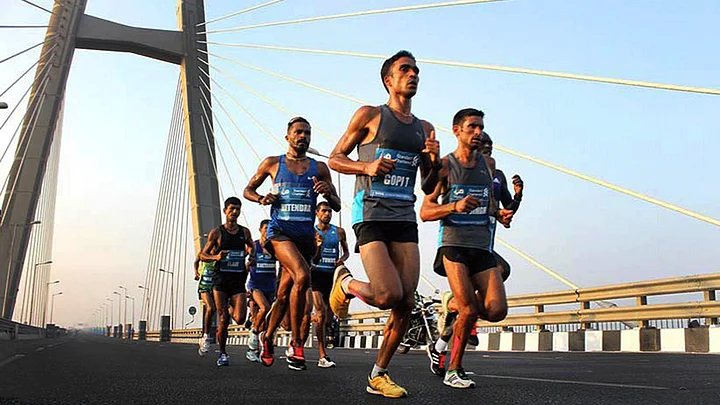If running a marathon was easy, everyone would do it. 42 kilometres in warm and humid Mumbai can be gruelling for anyone and everyone, and especially so for K Ramachandran and Nandkishore Mittal.
Come 15 January, and these guys will be joined by their gang of 86 extraordinary people who will run the Standard Chartered Mumbai Marathon after an open heart surgery.
And you thought life comes to a halt after a heart attack? Well, the only side effects this bunch of determined souls will have are sweating, euphoria and a general sense of awesomeness.
A ‘Runner’s High’ Has an All Together Different Meaning For These Heart Patients
A heart attack is awful in some ways but for 71-year old Ramachandran, it put everything in perspective. He’s been waking up at 6 in the morning, training six days a week for his fourth straight marathon. And it’s not that he was a born runner. In practice sessions, he’s not the strongest or the fastest runner in his group but for his age, he sure as hell works out the hardest. And that’s what counts.
A diabetic, suffering from high blood pressure, this Mumbai-based businessman’s mantra - if running is difficult, run some more.
I underwent a bypass with five grafts in 2009 and it was life shattering. After the operation you have to learn how to walk and talk again. The cardiac rehabilitation programme at the Asian Heart Institute helped me immensely. Today I run 8 kms everyday, cycle for 90 minutes, followed by a 20-minute long trek.K Ramachandran, Bypass Patient, Marathon Runner
With age, Ramachandran has knee pain issues and relatives advise him against running but he feels miserable if he doesn’t work out. His doctor is happy with his health and has given him the go ahead. If you are participating in the Mumbai marathon this weekend, watch out for this dude slaying it at 71!
For 60-year-old Nandkishore Mittal, acing a marathon is not about being better than someone else. A couple of months after his heart surgery in 2007, he took up running and jogging. Since then, he religiously follows a strict schedule of running 40 kilometers a week. The competition is with himself - to be better than what he used to be.
I was a smoker, had diabetes and hypertension. A routine check-up before the Amarnath Yatra showed multiple blockages and I was instantly wheeled in for surgery. If that event didn’t happen, I would’ve never taken up running or any form of fitness. It’s a great feeling to repeatedly accomplish something you never thought you could do.Nandkishore, Heart Patient, Marathon Runner
Mittal says after the heart surgery his body felt weird, like it was telling him to stop, slow down. But the mind wanted to give his second lease of life the best shot.
Nine years ago, he took up running in a carefully-monitored programme by cardiologist Dr Nilesh Gautam, where the goal was to lead such a healthy life that marathons become routine. Being a deskie all his life and a marathon virgin, it scared him a little, but excited him a lot. Four marathons later, his family says it still feels like a miracle each time he touches the finish line.
Dear sirs, thank you for being out there, it inspires average people like me to get out there myself.
From a Patient To a Pacer
Heart attack patients are advised to lead a healthy, active life post surgery but how much strain each patient can endure is determined by a cardiopulmonary exercise test. This test finds out the damage done to your heart muscles after the attack.
After a heart surgery, doctors advise four-to-six weeks of rehabilitation training under medical supervision. So basically, if you’re a patient, don’t go out there and start prepping for distance runs on your own. Take it slow, build strength and stamina gradually and learn the tricks from an expert. If there is any discomfort on the day of the run, seek help from one of the medical booths at the venue.
As for the 86 heart patients who will participate in the marathon, you’ve got what it takes but reaching the finish line will take everything you’ve got. Three cheers!
Also Read: What Is the Best Exercise For a Sharp Brain?
(At The Quint, we question everything. Play an active role in shaping our journalism by becoming a member today.)
